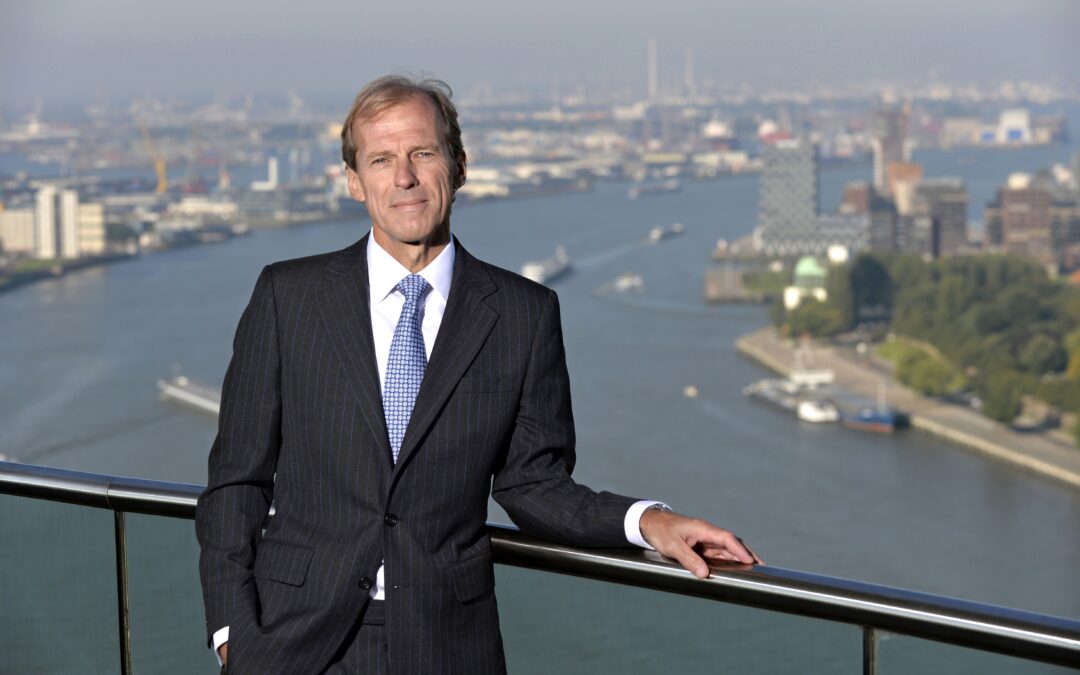The Port of Rotterdam expects throughput may fall by up to twenty per cent this year due to the corona crisis. ‘So yes, results will be bad,’ says Allard Castelein, CEO of the Rotterdam Port Authority. ‘Yet, I am positive about the future. The crisis can also bring new opportunities and gives us a chance to distinguish ourselves.’
Castelein says this in a webinar organised by Nieuwsblad Transport, a sister publication of SWZ|Maritime, on 17 April. ‘Considering the circumstances, the Port of Rotterdam is functioning well,’ says Castelein. ‘But the results are bad and we will have to deal with that. For this year, our throughput may decrease by ten to twenty per cent.’
When asked what worries him most, he says: ‘Of course I am most worried about people’s health, but what also worries me is whether enough companies will survive this severe, unprecedented crisis. So that the moment we can spring back when the health situation allows it, we also have the capacity to seize the opportunities that will undoubtedly come.’
Local production
The crisis has brought to the forefront how vulnerable Europe is when it comes to its supply chains that depend so heavily on Asia. Will this change in the future? Castelein: ‘That’s what the whole of the Netherlands is now wondering. Is just-in-time logistics still in the picture? Do you have to be so dependent on flows from other regions? I think that once the health situation improves, we will first try to get back to the way things were as soon as possible. Yet, at the same time, companies, sectors and the government will start to review the situation, because how dependent do you want to be? Would you also want a certain capacity closer to home?’
Is just-in-time logistics still in the picture?
‘Issues like that will certainly come up, but they’re not going to play tomorrow. Right now, it is all about surviving today, being able to act tomorrow and making the decisions that will play the day after tomorrow,’ Castelein adds.
‘I for one hope there will be shorter supply chains. I hope companies see opportunities. Why do mouth caps have to come from China? How can we create a good investment climate and how can companies capitalise on the opportunities this can offer?,’ Castelein asks. ‘We have noticed how vulnerable we can be. Please, let’s try to use the production quality of this country with tremendously good companies, people, technology and infrastructure in such a way that we can become a production location at least for the Netherlands, but perhaps also for Northwest Europe.’
Opportunities in new business models
Castelein stresses the success of the port complex is based on more than just volume and making a profit is not the port’s main goal. ‘It is also about the impact we have on society, the employment we create, the quality of goods, the safety with which we act, that we are not corrupt, that there are equal rights for men and women, that we do not have child labour. That is an incredible quality we have. I really hope that we can continue to use that quality and that volume and size no longer have to be the most important driving force, because it is not a sustainable business model. Because let’s not forget that in addition to this pandemic, we also have a climate crisis that we have to deal with. So you have to look at new business models and activities. That doesn’t necessarily means bigger and more.’
The Port of Rotterdam won’t be growing any bigger any time soon
‘If you look at our port, it is of course very logical that we won’t be growing any bigger any time soon. This does not mean I resign myself to the fact that it wouldn’t be possible. But the reality is that we are going to lose large coal and oil flows. So we need to focus on those implications and, through digitisation and energy transition, invent new projects and new revenue models so that new business activities can emerge. So I’m positive about the future, but it’s different than in the past. That’s why I’m mainly looking at how we, as a port complex, can play an important role in that new society.’
Concerning the energy transition, Castelein sees this as an important part of the future earning capacity of the Netherlands. ‘I am very happy to get confirmation from the companies and the government that if we have to do anything, we should actually speed up that energy transition. Because that energy transition is also linked to the new earning capacity of the Netherlands. All major projects are still going ahead because all companies are aware of this.’
We can come out of it stronger
‘I think that if our companies are able to weather this crisis, that is also a sign of quality in thinking and acting and that we can come out of it stronger. And that a lot of opportunities will arise. Look, if it was easy, then anyone can do it. And this is a difficult phase and that also gives us the opportunity to distinguish ourselves.’
Watch the full webinar by Nieuwsblad Transport (in Dutch only) below:








